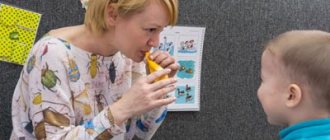general information
Normally, the baby pronounces the first word at the age of 10-11 months; a simple phrase appears at the age of one year. Due to various factors, this does not happen; the child remains silent or limits himself to onomatopoeia. This happens for various reasons.
At three years of age, a child’s speech is characterized by:
- sentences of 3-4 words;
- singular and plural are used;
- the relationship between word and object;
- simple prepositions;
- the ability to present events sequentially;
- adjectives, adverbs and pronouns appear.
Incorrect sound pronunciation (absence of hissing, whistling sounds) should not cause alarm. These groups will appear later in speech; the organs of articulation are not ready to reproduce them.
There are no delays in physical development; the baby begins to sit, stand on his feet, and walk in due time. The only thing that is noted about him is the absence of speech or the use of incomprehensible words, the so-called “bird language”. The child randomly connects sounds, comments on all actions, but no one understands him.
An example of such speech: “na gokazhi” is translated as “the car is going to race.” The baby arbitrarily uses syllables, rearranges them, distorts sounds.
In childhood, echolalia is observed, that is, the child speaks like an echo, repeating the last syllable of the word: “Ma-sha” turns into “...Sha.” All this is characteristic of delayed speech development (SDD).
Children with problems in speech development understand directed speech and point at objects, pictures, and people with a pointing gesture.
Preschool age
Three-year-olds are already able to express the simplest judgments, generalize, establish the simplest relationships and distinguish between similar objects.
Vocabulary by the age of 4 is about 2000 words . The child increasingly uses pronouns, adjectives, adverbs in speech, and numerals appear. Sentences are constructed according to the laws of grammar, and he gives detailed answers to questions. Speech becomes clearer, most sounds are pronounced clearly. However, despite significant progress, speech is still far from perfect. Therefore, do not worry if a three-year-old child cannot yet coherently talk about a walk or retell a fairy tale. You should not be alarmed by grammatical errors or inaccuracies in the use of auxiliary parts of speech. This will correct itself by 6-7 years. However, even at this age, errors in the use of individual case forms are still common.
By the same age, children, as a rule, master the correct pronunciation of all consonant sounds: by the age of 4 - whistling sounds ([s], [s'], [z], [z'], [ts]); by 5 years – hissing ([w], [z], [ts], [h]), by 6 years – sonorous ([р], [р'], [л], [л'], [й] ).
If a child of 6 years old cannot pronounce, pronounces one or more sounds incorrectly or distortedly, the help of a speech therapist is needed.
Reasons for violation
Experts do not have a consensus on why speech development is impaired. Conventionally, there are two groups of factors: biological and social.
The first include diseases of the father and mother, the pathological course of pregnancy, childbirth, and the first year of the baby’s life. The baby is sensitive to the environment, infectious diseases, injuries cause disruption of the brain.
Hypoxia and asphyxia are dangerous due to oxygen starvation. Lack of oxygen for a long time leads to the death of nerve cells. During childbirth, incorrect actions of the midwife will lead to injuries to the neck and head - this negatively affects the blood vessels. Insufficient blood flow to the brain negatively affects its functioning.
Poor environmental conditions have a negative impact on children. Emissions of harmful substances appear not on parents, but on their children. Therefore, after serious disasters (burning forests in the Moscow region in 2010), there has been a surge in the birth rate of children with pathologies of the nervous system.
Brain development is not fully understood. Experts pay great attention to social factors. During childhood, babies are sensitive to their environment. The lisping language of adults is unacceptable, as children easily adopt the pattern.
Lack of social contacts, limitations, and addiction to television lead to delayed speech development. The child begins to entertain himself and invents his own language. Without feedback from a parent, he will not improve it.
Why did the child begin to speak quickly and unintelligibly?
The reasons why children speak quickly and slurred have not yet been precisely established. Experts have identified several provoking factors leading to tachylalia. It could be:
- heredity. According to recent studies, most children suffering from rapid speech rate have relatives with the same problem;
- neurological problems. They can be caused by infections, injuries and diseases of the nervous system.
If a child speaks quickly and indistinctly, then do not panic. Contacting specialists will help identify the cause of the violation and correct it.
Separation of diagnoses
Formulation of the correct conclusion allows you to select an accurate correction route. It helps to completely cure the disease, allowing the child to go to a regular school.
A child may speak his own language due to psychiatric problems. Schizophrenia rarely starts in preschool age; more often it debuts in adolescence against the background of hormonal shocks.
Schizophrenia and autism are not the same thing. The second never flows into the first. These diseases have different symptoms, prognosis, and treatment.
It is difficult to diagnose schizophrenia in children. Within a month you should observe:
- strange fantasies, the child does not draw the line between the real and imaginary world;
- unreasonable fears;
- deterioration of everyday and social skills;
- incoherent speech;
- unmotivated aggression;
- contrasting drawings.
The diagnosis is made by a psychiatrist after long-term observation and a series of tests. With proper organization of the child’s life, attacks can be reduced and remission occurs. To do this, remove stress, be active, and maintain a daily routine.
Without timely treatment, mental retardation develops a second time. At the age of three, signs of antisocial behavior appear.
With autism, the child concentrates on the inner world. He will come up with a personal system of rules, rituals, and strictly follow it. The speech is incoherent, understandable only to him, and does not make contact. Noticeable from an early age:
- silence;
- avoiding eye contact;
- negative reaction to touch.
Over the years, the severity of the defect becomes stronger. In severe forms, the patient completely withdraws into himself, does not use speech, and does not enter into social contacts.
With dysarthria, problems arise only with the pronunciation side of speech. Children distort sounds, change them into simple phonemes, but their speech is relatively understandable to others. They use phrases, parts of speech, and can say whatever they want.
With alalia, the child does not speak or is limited to onomatopoeia. In the sensory form, it does not react to addressed speech, does not perceive it, and does not use a pointing gesture. With motor skills, he follows instructions but does not speak. Brain examinations reveal lesions in Broca's or Wernicke's areas.
When speech development is delayed, there is an immaturity of the cerebral cortex, which goes away on its own. As soon as a child goes to kindergarten, he seems to have a breakthrough and begins to actively chatter. With alalia this is impossible.
A competent diagnosis is important for building corrective work. In domestic defectology, an integrated approach has been adopted. Therefore, they use the help of medical, psychological, and speech therapy specialists.
A 3-year-old child speaks poorly: what to do?
It is necessary to sound the alarm (the child has a clear delay in speech development) if by the age of three the child:
- A sufficiently developed speech apparatus has not been formed.
- There is no use of common phrases.
- There is no good speaking (the pronunciation of hissing, whistling, soft and hard sounds is impaired), incorrectly pronounces sounds similar in pronunciation S and Sh, Z and Zh, Ch and Shch, syllables are skipped, rearranged, replaced in words, poor vocabulary, only monosyllabic ones are used words, words incorrectly agree by gender, case and number.
- There is no ability to read aloud, recite poetry or sing by heart, and there are no signs of mental retardation.
The main actions of parents in this case are as follows:
- Start actively talking with the silent person. It is necessary to voice all your actions, involving the child in the communication process. At the same time, you should listen and understand, react to his babble, and unravel his intonation. This encourages your baby to further develop his communication skills.
- Involve in active games. The adult’s task is to give the child not only physical food for the child, but also emotional “food” for the mind. The baby himself, due to his age, is not yet capable of this. Simple toys (balls, pyramids, games (hide and seek, catch-up)) are necessary for a child at an early age for his full development, and they should not be underestimated. And here the most important thing is that the interaction takes place between an adult and a child not in silence, but with the spoken actions being performed, so that the child’s brain creates stable connections between words and actions.
- Reading aloud together. Fairy tales with interesting and easy-to-understand plots and bright illustrations, funny songs and rhymes, read aloud or by heart, enrich vocabulary. While reading, you should talk through what is happening, describe the characters, illustrations, addressing the baby, involving him in communication.
- Communication with peers. It is possible that the child lacks communication with other children. The baby may be timid and passive by nature. In this case, parents should take the initiative, involve the child in joint games with other children, walk with him on playgrounds where he can meet his peers, organize events at home to which friends, neighbors, and relatives are invited with their children . All this is extremely necessary for the child to learn to communicate, so that he has the need to express his desires through words.
- Development of fine motor skills. The area of the brain responsible for precise finger movements is located next to the speech center, so the development of motor skills helps to overcome the lag. To improve fine motor skills, you can assemble puzzles, sculpt from plasticine, tie shoelaces, and fasten buttons.
Games for speech development in the senior group of preschool educational institutions
Note! Communication and joint reading aloud should take place in a friendly and welcoming atmosphere. Only in this case will all these actions help achieve the desired goal (to develop the baby’s speech skills and overcome developmental delays).
Speech therapy diagnostics
Speech problems are rarely visible from birth. Delays and developmental disorders become obvious by the age of three. If by this period there is no improvement, the speech is incomprehensible to others, parents need to show the child to a speech therapist.
You cannot delay your visit to a specialist. Early diagnosis and timely assistance increases the likelihood of a positive outcome and complete cure.
The speech therapist plays with the baby, shows him objects, and studies the degree of understanding of the spoken speech. The number of sounds, words in speech, and the presence of distortions in the syllable structure are recorded.
An anamnesis must be collected: illnesses of the parents, the course of pregnancy, development in the first year of life. The family situation, climate, and education model are studied.
Pictures are not used to examine three-year-old children, as it is difficult for them to perceive them. The specialist carries out diagnostics only during the game.
A consultation with a neurologist, psychiatrist, or audiologist is required. They check for organic problems and recommend treatment if necessary. Hearing problems require different types of help than speech delays.
Examination methods include electroencephalogram (EEG), MRI, and ultrasound of cerebral vessels. This will allow you to identify organic changes and circulatory difficulties. Drug treatment is prescribed to stimulate brain function.
A psychologist studies the state of higher mental functions - memory, thinking, attention. If necessary, special work is carried out to develop them.
A 3-year-old child speaks poorly: should I worry?
The reasons for delayed speech development in a child in the third year of life can be different. The main factors if a child speaks only the first syllables of words or does not speak at all are physiology and psychology, which also includes social reasons:
- Individual rhythm. Each child develops at its own pace. In this case, you should not worry that something is wrong with the baby, but this only applies to those situations where there is only a slight deviation from the norm in the child’s development.
- Absence of necessity. In the case of excessive parental care, the child simply lacks the motivation to learn to verbally express his desires. And motivation is the main engine of development.
- Pedagogical neglect. From the first days of life, a child should be surrounded by speech. If parents and other adults talk to him little, doing only the necessary minimum of care and feeding, then the formation of speech and vocabulary is simply impossible.
Silent baby
- Bilingual family. Bilingual children also lag behind the norm because they are surrounded by speech in different languages, and the brain requires additional time to separate languages, form the speech apparatus and vocabulary.
- Psychological shocks. Severe fear, frequent family conflicts, and an uncomfortable psychological situation are also reasons for the lag. For any development, positive emotions and the goodwill of others are necessary, and even more so for the development of children.
- Negativism of a child. If a child is often under strong pressure to say certain words or phrases, he will develop a persistent reluctance to do so, especially if he has a particularly stubborn character.
- Genetic predisposition. If one of the baby’s parents started talking relatively late, this may be inherited.
Bilingual family
- Complicated pregnancy and childbirth in the mother. Difficulties in intrauterine development or a difficult course of labor can affect the formation of the nervous system and affect the child’s talkativeness.
- Hearing impairment. One of the most common problems in the development of the speech apparatus in a baby is that he does not perceive the speech around him.
- Imperfection of the articulatory system. The presence of physical problems (short frenulum, underdeveloped tongue muscles) leads to problems with the formation of sounds and, accordingly, the speech apparatus.
- Pathological problems of development. Various genetic diseases (such as Down syndrome, autism) directly affect the development of a child’s speech. In these cases, the help of specialized specialists is necessary to correct the delay in the development of his speech.
Important. In the case of a delay in the formation of speech in a child, a hearing test by an otolaryngologist is necessary first.
Correcting the problem
In case of problems with speech, the leading role in the work is given to the speech therapist. Its task is to cultivate speech activity. For this purpose, special classes are held where the speaking process is stimulated during games.
To develop the correct pronunciation of words, they start with onomatopoeia, simple words: mom, dad, give, baba, nanny, etc. The child is given a doll, then the speech therapist asks to return it: “Masha, give me.”
Verbs are introduced into speech: “catch”, “carry”, “roll”. Ball games are good for learning them. The Novikova-Ivantsova technique allows you to correct violations of the syllabic structure of a word.
Sensory integration is carried out. Interaction with different materials stimulates the nervous system. Large beans, cereals, chestnuts are poured into a basin and small toys are hidden among them. Handling small objects stimulates fine motor skills and the corresponding area of the brain.
Parental participation is required. At home, they are a model of speech for the child. They correctly name objects, pronounce words clearly, and correct the baby.
The speech therapist teaches the child to construct a simple phrase of 2-3 words, works on clear pronunciation of words, and expansion of the active vocabulary. After the consolidation stage, they move on to the following: correction of sound pronunciation, introduction of parts of speech, pronouns.
Is it possible to prevent the development of dyslalia?
Speech therapists give the following advice.
- When learning a language, a child imitates those around him. Make sure he only hears correct, clear speech. If among your loved ones there is someone with a “fiction defect,” then explain to the child why it is necessary to speak like a person who clearly pronounces all sounds. Don’t lisp, don’t use distorted words like “komalika” instead of “komarika”.
- Do everything to ensure that your child has the correct bite. Excessive consumption of soft foods, pacifiers, prolonged breastfeeding - all this is harmful for the proper development of teeth and jaw, and muscles of the speech apparatus.
- Develop fine motor skills. As you know, the motor and speech centers are located nearby, and small movements of the fingers and stimulation of the nerve endings on the inside of the palm contribute to better blood supply to the necessary parts of the brain.
Forecast
The sooner the diagnosis is made and corrective assistance is started, the greater the chances of a complete cure. The average duration of treatment is about three years. Comprehensive support from specialists is required.
Classes with a speech therapist should be five times a week. Therefore, it is better to transfer the child to a specialized kindergarten. Parents work with their preschooler every day and follow the recommendations of specialists.
In severe cases, problems with oral speech provoke writing and reading disorders. Sometimes children with such defects have to go to a fifth-type correctional school (for people with severe speech impairments).
Why does “earlier” mean “better”?
The child's body is unique in its ability to compensate. Absolutely all doctors say that the earlier a disease or developmental pathology is detected, the easier it is to eliminate it.
In particular, teaching a small child to speak is much easier. At this age, the most active processes of speech formation take place. Right now it will be much easier for him to catch up with his actively chatting peers. 13 ways to teach a child to speak at 2-3 years old.
In addition, long-term speech delay leads to other troubles - mental retardation. Correct speech and the ability to communicate give the child the opportunity to develop. Lack of communication inhibits the formation of cognitive processes and the emotional-volitional sphere. Ultimately, the child will fall far behind his peers. The preschool period is characterized by the most active development of all areas. This means that by the time school arrives, the gap will be very serious.










